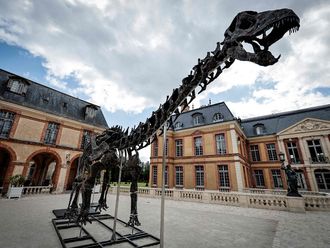Geneva/Buenos Aires: The United States and Japan assailed Argentina’s import rules as protectionist at the World Trade Organisation on Tuesday, putting more pressure on the country to revamp policies that many trading partners say violate global norms.
The two complaints mirrored litigation brought by the European Union in May and triggered a swift reaction from Argentina’s centre-left government, which vowed to challenge US rules on lemon and beef imports.
Argentina is seen by many fellow Group of 20 nations as a chronic rule-breaker since it staged the world’s biggest sovereign debt default in 2002. It remains locked out of global credit markets and relies on export revenue for hard currency.
President Cristina Fernandez’s government has angered trade partners by moving to slash imports and riled historic ally Spain with the takeover of energy company YPF.
The disputes at the WTO reflect mounting frustration with the country’s unorthodox policies.
“Argentina’s protectionist measures adversely affect a broad segment of US industry, which exports billions of dollars in goods each year to Argentina. These exports support jobs and businesses here at home,” US Trade Representative Ron Kirk said in an emailed statement.
“The Obama Administration insists that all of our trading partners play by the rules and uphold their WTO obligations so that American workers receive the benefits negotiated in our agreements,” the Kirk statement added.
Argentina began requiring prior state approval for nearly all purchases abroad in February. Imports have since fallen compared with last year’s levels, boosting the prized trade surplus but causing some shortages of goods and parts and sharply reducing capital goods imports.
EU and U.S. officials say Argentina has effectively restricted all imports since the new system came into place.
Argentina’s Foreign Ministry did not comment directly on the U.S. and Japanese complaints, but instead advised that it would file a complaint with the WTO over Washington’s policies it says
hamper lemon and fresh beef imports.
On Monday, Argentina hit the EU with a separate WTO complaint, alleging discriminatory treatment by Spain against Argentine shipments of biodiesel.
“This measure, like others taken by the European Union and other developed countries for decades, effectively aims to keep our industries from rising along the value chain, limiting the role of developing countries to the provision of raw materials,” the Foreign Ministry said in a statement.
It also rejected the “offensive” against Argentina’s trade policies, which it described as “legitimate measures adopted in the context of a global crisis that originated and has its epicentre in developed countries.”
More than 20 WTO members have criticized Argentina’s import rules, contributing to a sharp worsening of its international trade relationships since Fernandez seized control of YPF from Spain’s Repsol in May.
The South American country has also been questioned over its widely discredited inflation data, its refusal to honour US court judgments in favor of creditors affected by the 2002 default, and its reluctance to repay the Paris Club of creditor nations.
Despite chagrin with her government abroad, Fernandez won a landslide re-election last year on promises to keep stoking high growth and increase the state’s role in the economy, despite complaints from investors that her policies made it difficult to import products necessary to keep local businesses running.
Latin America’s No. 3 economy relies heavily on a robust trade surplus, which is used to help fatten central bank foreign reserves tapped to pay government debt. The government has also moved to curb imports to protect local jobs, while imposing capital and currency controls to keep dollars in the country.
“Import growth has halted, which we should have done long before,” Foreign Trade Secretary Beatriz Paglieri was quoted as saying on the presidential website last weekend.
The EU has said the country’s import licensing rules were unjustified and “aimed at advancing the Argentinean Government’s stated policies of re-industrialization, import substitution and elimination of trade balance deficits.”
WTO members have the right to ask importers to apply for an import license, but they are supposed to grant them automatically. In Argentina, however, many licenses labelled “automatic” suffer long delays, according to the European Commission.
Argentina has also been criticized for a policy of “trade balancing,” which forces an importer to guarantee an equal value of exports. That has spawned offbeat deals whereby a car producer, for example, must ship a large amount of rice out of the country in return for a consignment of vehicle components.
“Argentina may claim that companies enter into these arrangements voluntarily, but many of the (WTO) members supporting this statement share concerns that it may be operating otherwise,” U.S. Ambassador to the WTO Michael Punke said in March, in a statement backed by 13 WTO members.
An official at Argentina’s Foreign Ministry disagreed with the government’s exports-for-imports policy, saying it was untenable.
“This is a lost cause from the start,” the official said on condition of anonymity. “There’s no way to defend trade curbs that impose a dollar-for-dollar policy. In this case, the law is against Argentina.”
Argentina is the second nation to be hit by a triple complaint by Japan, the EU and the United States this year. On March 13, the three joined forces to hit China with a trade suit over exports of rare earths and other metals.
The number of trade disputes launched at the WTO so far this year has jumped to 18, already more than double the eight that were filed last year.
Argentina now has 60 days to satisfy Japan and the United States that its policies comply with WTO rules or face a possible escalation of the dispute. Afterward, the complainants can ask the WTO to adjudicate, which could end in Argentina being forced to repeal any laws found to contravene WTO rules.
The European Union has not said whether it will ask the WTO to set up an adjudication panel on its dispute with Argentina.












